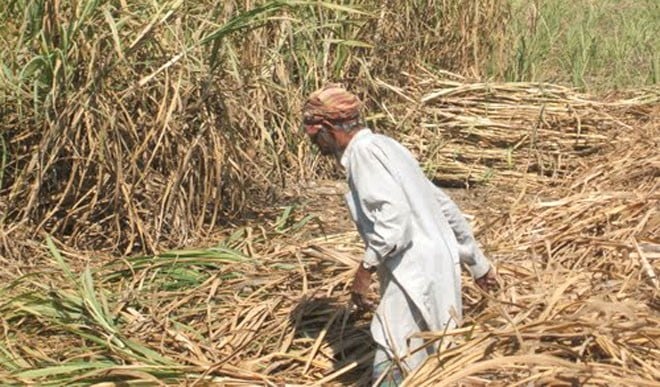
Growers of sugarcane and mills owners cry foul as government referees

Grown in tropical and sub-tropical regions in a range of climates from hot dry environment near sea level to cool and moist environment at higher elevations, sugarcane is an important cash crop of Pakistan and many countries of the world. Pakistan ranks fifth in cane producing countries and 15th in sugar production.
The estimated crop area of sugarcane during the crop cycle 2013-14 was reported to be around 1.13 million hectares compared to 1.111 million hectares during preceding crop cycle, i.e., 2012-13. Last year, 86 sugar mills across the country crushed 50,089,483 tons of sugarcane and produced 5,030,129 tons of sugar. The rate of sugarcane was Rs170 per maund for Punjab and Rs172 per maund for Sindh. This year, the government in consultation with the stakeholders i.e. sugar mills owners and the cane growers set the price of sugarcane at Rs180 per maund in September.
Sindh sugar millers then went to the high court against the fixation of price and the court ordered the government to review the price. The Sindh government following the court orders reviewed and settled the price at Rs155/maund as demanded by the complainants. This annoyed the other stakeholder -- growers -- and they came up to protest vigorously against the decision as the price already settled (Rs 182/maund) was lower than their demand i.e. Rs200/maund. The government took up the issue urgently and fixed the price again at Rs182 to amicably resolve the issue.
Although the situation was going easy in Punjab, sugar mills started demanding a cut in price after the decision made by the Sindh government to reduce the sugarcane price. The sugarcane price was Rs 170/maund for the last two years and it was settled at Rs180 with the consent of both sugarcane growers and sugar mills owners.
According to analysts, the demand seems justified as sugarcane is being produced in surplus and in a corollary sugar is also being produced in surplus. "Domestic sugar need is 4.5 million tons whereas last year production was 5.7 million tons. It means we have to export that excessive amount of sugar produced," says Iskander M. Khan, chairman Pakistan Sugar Mills Association. "I am afraid we are unable to do so because the international market price of sugar is lesser to our domestic cost," Khan further adds.
Chairman PSMA still doesn’t think subsidy to sugar mills is a good solution. Instead he is of the view that price of sugar should proportionate to the price of sugarcane. "If sugarcane price is Rs180/maund, sugar price should be Rs 64/kg," he suggests. In this regard, he gives the logic that 70 per cent use of sugar is industrial and the prices of those products which have sugar as major component are higher than those four years ago when sugar was Rs80/kg, whereas the price is to give relief to the domestic users so sales tax can be waived for domestic users. "Sugar mills won’t be able to pay the growers after one month if the same rate persists," he fears.
On the other hand, farmers demand the price of sugarcane to be fixed at Rs 200 as rise in price of pesticides and fertilizers have increased the production cost. Hamid Mallhi, Director Farmers Associates, says "Although the price fixed at Rs180 per maund is not up to our demand, still we have compromised for some positive solution." Though Mallhi admires the role of the government, still he demands a solution acceptable to all. "If Rs5 per kg subsidy on sugar price can help export the excessive sugar and give Pakistan 500 million dollar foreign exchange then the government should work on it."
Here comes the role of Cane Commissioner Office which is there to ensure payments to growers as per Control Act. As sugarcane is a 14-month crop, farmers totally rely on the crop for his household and other needs. So to motivate the farmers to grow the sugarcane crop, the government ensures the crop is sold in time and farmers are paid through the cane commissioner. The government also fixes the price of sugarcane and the end product i.e. sugar keeping in view supply and demand.
"We are here to ensure payment to farmers is made by the mills owner within 14 days of supply as per law," says Nasir Mehmood Bashir, Sugarcane Commissioner Punjab. "After the said period, the payer is liable to 11 per cent interest. He is of the view that the government should work out a solution acceptable for both farmers and millers.
PSMA has filed a writ petition No. 32746 in Lahore High Court to review the fixed rate i.e. Rs180 and the court has ordered review of the rates. The court also advised the mills to purchase the crop on the said rate till further orders. In case any mill refuses to do so, the cane commissioner will take necessary action as per the law.